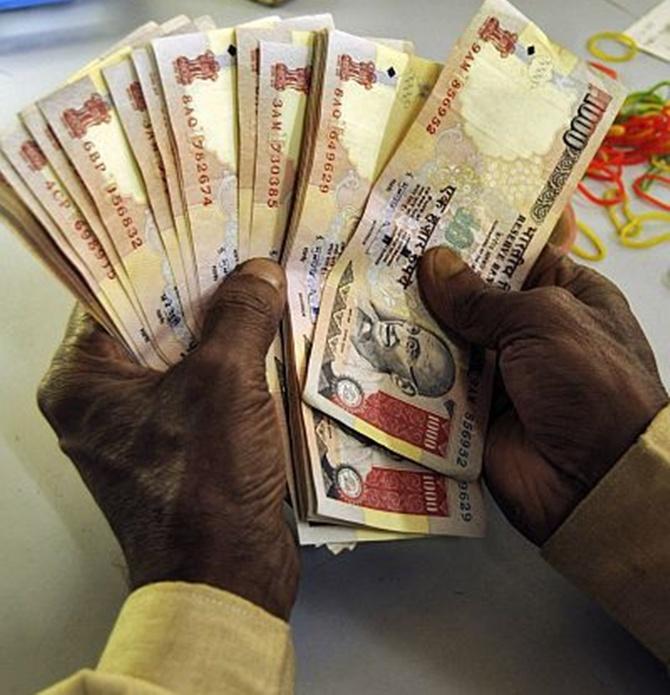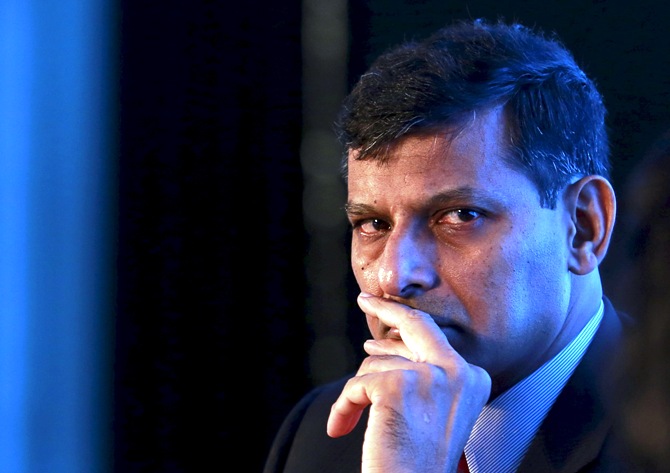 Reserve Bank of India Governor Raghuram Rajan on Tuesday said the inclusion of Chinese yuan into IMF's reserve currency basket may lead to more devaluation of the unit but ruled out any such ‘big bang’ internationalisation for the rupee and favoured a ‘steady’ opening up.
Reserve Bank of India Governor Raghuram Rajan on Tuesday said the inclusion of Chinese yuan into IMF's reserve currency basket may lead to more devaluation of the unit but ruled out any such ‘big bang’ internationalisation for the rupee and favoured a ‘steady’ opening up.
"The Chinese devalued the yuan initially but then stopped and, in fact, it came up a little since then.
"Perhaps, with the Chinese inclusion in the special drawing rights basket of the International Monetary Fund, we may see a little more of devaluation," Rajan told reporters at the customary post-policy review conference with analysts and economists.
However, when asked about the rupee, which has not been able to leave a similar mark on the world stage as its Chinese counterpart, Rajan sounded a bit defensive, saying we are on a cautious but steady process of internationalisation and will not go in for big bang measures.
Enumerating the steps taken to open up the market in recent months, which include increasing the foreign portfolio investments limits for foreign investments, a review of the ECB guidelines done on Monday and also the Masala Bonds, he said, "all these are in direction to open a little more, but at the same time, it is not a big bang where we lose control over the process, it is a steady process."
"We are taking steps, we are steadily moving towards being a much more open economy while keeping (in mind) some of the concerns about stability," the Governor said.
Asked to compare India and China vis-à-vis internationalisation and their financial markets, Rajan said each has its own strengths.
"On some dimensions, we are ahead of China.
"In terms of the degree of competitiveness within the banking system, some of the markets we have made some steps which put us ahead," he said.
But China is ahead in terms of the size of the economy, extent of trade, denominating trade in the yuan, the Governor added.
"We are taking steps, we are steadily moving towards being a much more open economy while keeping some of the concerns about stability," Rajan said.
The International Monetary Fund on Monday welcomed the yuan into its elite reserve currency basket, recognising the ascendance of the Asian power in the global economy.
The yuan, also known as the renminbi, will join the dollar, euro, yen and the pound next year in the basket of currencies that the IMF uses as an international reserve asset.
"Our sense, which is why we cut interest rates last time, was that the balance of risks -- how much we are wanting to do for energising growth versus how much we have to be worried about inflation -- allowed us to reach the policy stance that we did last time which we have maintained this time," Rajan explained.
On challenges emanating from the implementation of 7th Pay Commission that may result in annual outgo of a whopping Rs 1.02 trillion (Rs 1.02 lakh crore), equivalent of 0.65 per cent of GDP, to the central government employees, Rajan said the government will have to do budgetary tightening to ensure it adheres to the fiscal consolidation roadmap.
The comments come a day after the government said its fiscal deficit till October has already touched 74 per cent of the full year target at Rs 4.11 trillion, which though is less than what it was in the same period last fiscal at 89.6 per cent.
The fiscal deficit is pegged at 3.9 per cent or at Rs 5.55 trillion this fiscal against Rs 5.01 trillion or 4 per cent of GDP in 2014-15.
Rajan also underscored that both the quantum and the quality of the fiscal deficit matter.
Deputy RBI Governor Urijit Patel said that from April there might be an impact on retail inflation as the increase in house rent allowances for the central government workers gets captured following the new wage hike, but added that the RBI will look-through this impact in its analysis.
On the US Fed's likely rate hike at its December 16 meeting, Rajan said the shift in stance to rate tightening by the world's most powerful central bank may lead to some market volatility, but exuded confidence that the domestic markets should stabilise after initial difficulties.
Rajan continued to complain against the banks' refusal to pass on the benefits of RBI's rate cuts to borrowers, saying less than half of the 1.25 per cent cumulative cuts this year has only been passed on.
He further said the magnitude of the deposit rate cuts by banks has been higher than the cuts in base rates and gives banks more room to cut.
Image: A man counts rupee notes in a bank. Photograph: Reuters










 © 2025
© 2025